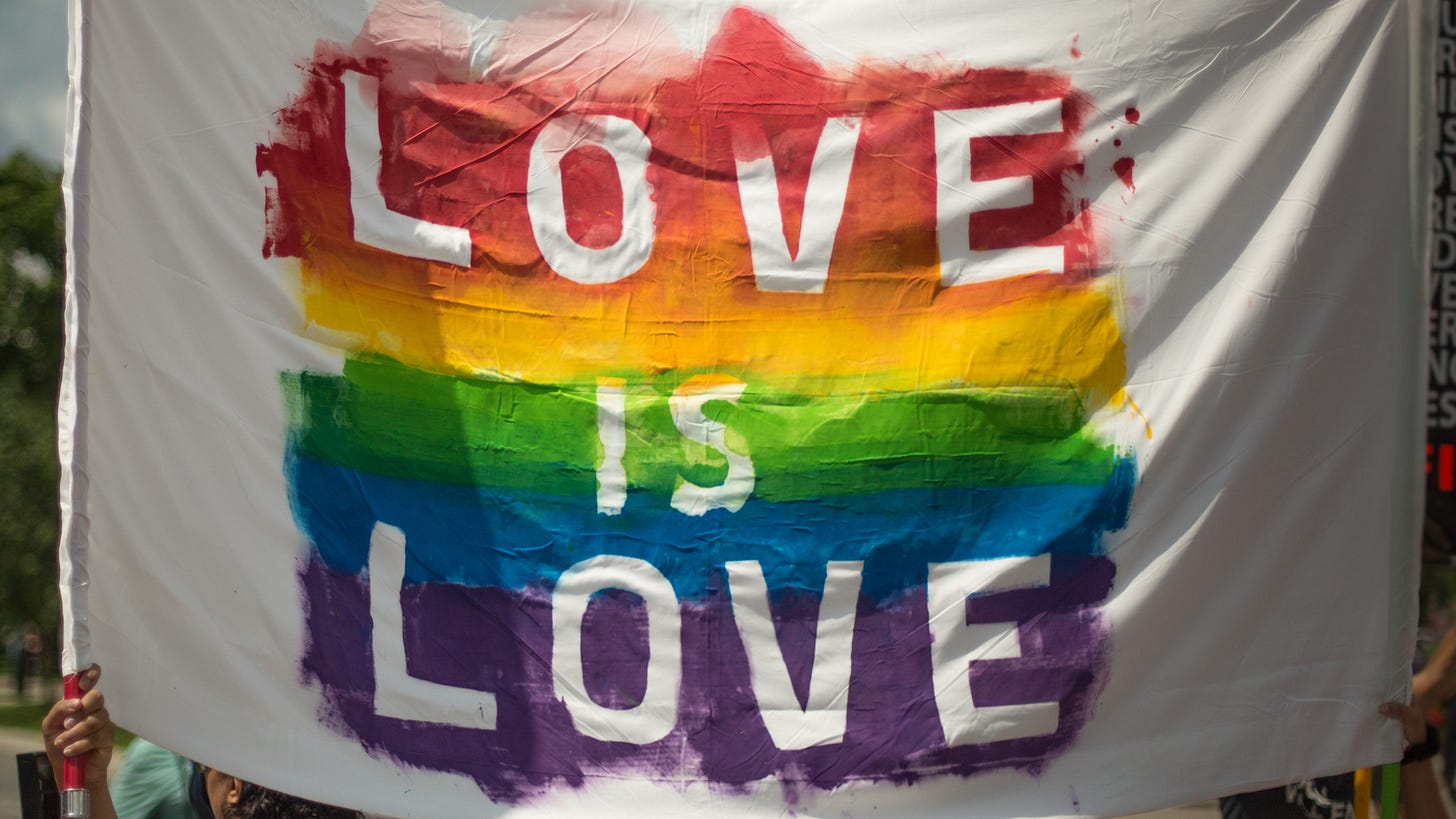Let's get together and feel alright
The One Love armband saga prompts deeper consideration of how symbolism and gesture are used in football
In the end, the band was banned. The seven-nation army of England, Wales, Germany, the Netherlands, Belgium, Denmark and Switzerland could, it turned out, be held back from displaying its support for diversity and inclusion when FIFA threatened punishment. And so, the One Love armband project became a source of embarrassment not for the host nation, Qatar, but for those critical of that country’s stance. As with so many battles in the culture wars, the real winner was whataboutery.
I can understand why the seven nations decided not to go ahead with the protest once FIFA threatened on-field punishment. I also understand the criticism drawn by the late decision not to go ahead with something that had been made a big deal of. This piece by Chloe Smith in The Athletic (£) is a considered summation of the criticism. I don’t agree with all the conclusions and attempting to put forward a more nuanced argument here will inevitably draw criticism. But without faith that reasoned discussion can make a difference, what have we got left?
The root of the problem is, as I argued in the last edition, the lack of any serious challenge to the original award of the 2022 Finals to Qatar. That was the time for leverage to be exerted, for nations to refuse to play games and test how far FIFA were prepared to risk their competition, for clubs to make a stand and perhaps refuse to release players. It would have been high stakes even then, but there would have been time for the issue to play out. National associations and clubs, however, made a conscious decision not to challenge. And I say ‘conscious decision’ because they cannot have been unaware of the issues – even in the bubble they inhabit.
Once the qualifying games started, the decision was locked in. But over the 12 years, that’s TWELVE YEARS, since the decision was taken, there have been plenty of opportunities to ensure that everyone didn’t arrive in Qatar needing to ‘send a message’. (Sending a message has become the new ‘something must be done’ – a reaction that has too often led to flawed policy). None of those opportunities have been taken, and so in the weeks leading up to the start of the finals you could have been forgiven for thinking the many troubling aspects of holding the tournament in Qatar had only just dawned on people. The One Love armband, itself a departure from existing initiatives, seemed to be a result of this need to do ‘something’. It was also a recognition that existing initiatives would meet with official disapproval – a de facto conceding of ground on key principles.
The fact that the One Love armband was literally a contrived initiative (contrived: adjective: deliberately created rather than arising naturally or spontaneously) may well explain the lack of resistance to its banning. The lack of roots on what was really a PR stunt intended to make the best of a bad job wouldn’t have inspired the strength of feeling needed to stand up to any threatened sanction. And the contrived character of the initiative also made it possible to separate support for the gesture from support for the principle – not wearing the armband just meant you weren’t wearing the armband.
The trouble is, much had been made of the wearing of the armband. There were plenty who criticised the initiative as little more than a gesture when the seven nations were talking it up. Ironically many of those same critics were among the most vociferous in denouncing the decision not to make what they saw as little more than a gesture. Jonathan Liew in The Guardian managed to simultaneously ridicule the gesture while questioning the moral fibre of those who didn’t indulge in it.
There was, too, something a little incongruous about Gary Neville and Ian Wright, who I greatly respect as football pundits, and because of some of their wider views, criticising the seven nations for backsliding while being paid to commentate on the tournament. An observation I recognise opens me to accusations of whataboutery.
The FA, and the other associations, backed themselves into a corner by not thinking things through and not being strong enough when it mattered. And the FA, reprising its habit of making a bad situation worse, decided that lighting up Wembley Stadium in rainbow colours while the eyes of the football world were on Qatar would be a good idea. It came across as feeble and confused.
So the seven nations marched their gesture up to the top of the hill then marched it down again. It was a mess largely of their own making, but let’s not forget the people who don’t respect basic human rights are the culprits here, not people who bungle their criticism of them.
Much of the criticism of the players for not going ahead with the protest centred on the fact that a yellow card would have been a small price to pay. But as I understand it, no one knew where any sanction would end. We’ve been told FIFA turned up mob-handed at the England camp on the day of the game threatening “unlimited sanctions”, and that any cards would be shown in the dressing room to minimise the profile of any protest.
Could, or should, FIFA’s bluff have been called? What would you have done if you had to take the decision that could lead to “unlimited sanctions”? And what would the reaction have been if that meant the team went out of the World Cup?
Of course, the immediate reaction is to ask whether losing a football match or going out of a competition is really so important when seen alongside fundamental human rights issues. And more than a few commentators contrasted the footballers’ decision not to protest with the stand taken by Tommie Smith and John Carlos, whose Black Power salute from the podium at the 1968 Olympics remains one of the most overtly political gestures made by any athlete. But it’s an erroneous comparison.
Smith and Carlos suffered for their stance. They were kicked out of the Games, ostracised by the sporting establishment for years, and subjected to death threats and abuse. They had also attracted criticism before the games from the Olympic Project for Human Rights, which had urged black athletes to boycott the games. Australian Peter Norman, the third man on the podium, was reprimanded by the Australian Olympic Committee and also shunned by sections of the country’s sporting establishment for expressing his support for the protest. But all three had succeeded at the highest level, winning medals in the Olympic 200 metres, before taking action. Which is what made their protest all the more powerful.
Their actions were borne out of genuine conviction, and the knowledge that their achievement would amplify their voice. If they’d telegraphed what they were going to do in advance, and been prevented from running, we wouldn’t be talking about them now.
None of this is to imply there was not genuine conviction among the players of the seven nations who planned to wear the armband. The question that’s really being raised here is how far it is possible and practical for sport to ‘make a difference’.
To be clear, I don’t agree with the nonsense about politics and sport not mixing. Returning to the example of the 1968 protest, Avery Brundage, head of the US Olympic Committee at the time, excused the fact that he hadn’t criticised the Nazi salutes at the 1936 Olympics but had criticised the Black Power salute by saying that the Nazi salutes were a national symbol in 1936 and therefore acceptable. There can be few starker examples of the truism that ‘political’ is the label given to actions by people who don’t agree with them, while those they agree with are ‘non-political’.
Sport generates enormous interest and therefore has the potential to wield enormous power. It’s A Good Thing that athletes are prepared to use their status to advance progressive causes – and also A Bad Thing that some use their status to advance reactionary ones. (I don’t go in for the both sidesism that tries to pass itself off as balanced commentary, I’m afraid). But athletes achieve the status necessary to influence wider matters by being successful, so how far can we criticise them for prioritising their sport? Are we placing too much of a burden on sport and sports stars by always expecting every event, every action, to be a symbol of something beyond sport?
I think we need to be a little careful, and possibly also consider whether our apparent eagerness for sport to take up the cudgels reflects rather badly on the willingness or ability of the rest of us to do so. Football, in particular, seems so often to be required to provide a backdrop for this or that protest or campaign. I wonder if that reduces the power of what’s done, if it makes the vast audiences immune through over familiarity.
I don’t have clear answers, but I’d like us to think a little more deeply about all this. What is for sure, and positive in my view, is that the Qatar World Cup is not the publicity victory that state’s rulers wanted, as this exchange between journalists Emily Maitless and Jon Sopel shows. Which I’d say is a positive note to finish on.

Header photo by 42 North from Pexels



